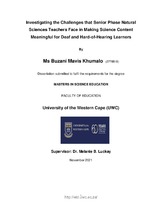Investigating the challenges that senior phase natural sciences teachers face in making science content meaningful for deaf and hard-of-hearing learners
| dc.contributor.advisor | Luckay, Melanie B. | |
| dc.contributor.author | Khumalo, Buzani Mavis | |
| dc.date.accessioned | 2022-03-09T07:18:23Z | |
| dc.date.issued | 2021 | |
| dc.identifier.uri | http://hdl.handle.net/11394/8847 | |
| dc.description | Magister Educationis - MEd | en_US |
| dc.description.abstract | The 1994 transition process provided an opportunity for a massive change in South African society in all spheres, including education. In the previous political era, deaf learners and other learners with disabilities were marginalized by the education system. In particular, there were weak mechanisms in place to ensure that these learners were placed in a system which recognized the many challenges of learners with disabilities, such as their disability needs, the training of teachers for deaf learners, acquiring equipment to support deaf learners, reserving special classes for deaf education, and most importantly, integrating all these aspects into the curriculum. Hence, the transition during the 1994 period provided a chance and an opportunity to address these challenges. | en_US |
| dc.language.iso | en | en_US |
| dc.publisher | University of Western Cape | en_US |
| dc.subject | Deaf learners | en_US |
| dc.subject | Inclusive education | en_US |
| dc.subject | Science education | en_US |
| dc.subject | Disability | en_US |
| dc.subject | Senior phase Natural Sciences | en_US |
| dc.title | Investigating the challenges that senior phase natural sciences teachers face in making science content meaningful for deaf and hard-of-hearing learners | en_US |
| dc.rights.holder | University of Western Cape | en_US |
| dc.description.embargo | 2023 |

